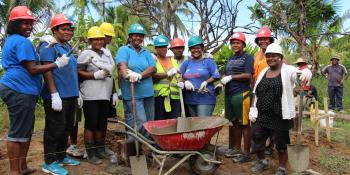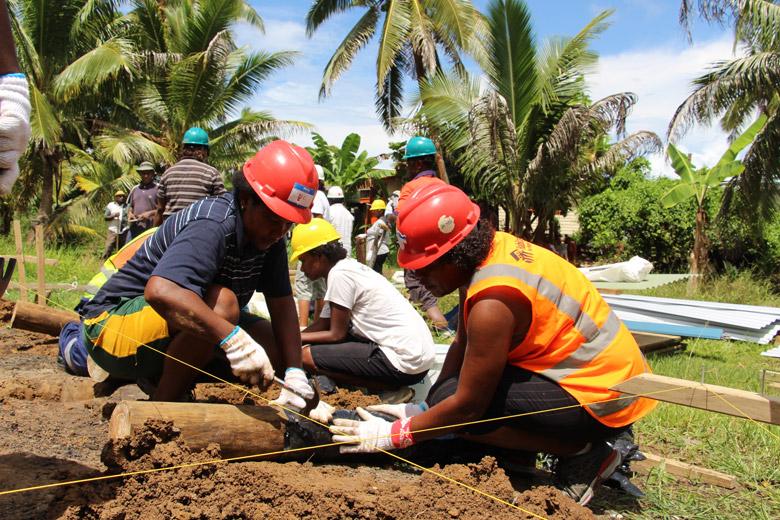
The subtitle goes here.
Habitat Fiji garners merit certificate at 2017 UN Sasakawa Award for Disaster Risk Reduction
SUVA (May 27, 2017) — Responding to Cyclone Winston — the worst disaster in the history of Fiji — has won recognition for Habitat for Humanity Fiji at global awards recently. Among four finalists, Habitat Fiji’s Build Back Safer program to reduce disaster risk and improve resilience has won a certificate of merit with a grant of US$15,000 at the 2017 UN Sasakawa Award for Disaster Risk Reduction. Since the launch of the Build Back Safer program in September 2016, about 2,000 people in 180 communities have been trained through the 80 training sessions that were conducted.
“Being one of the finalists at a global platform served to remind us of the enormous work that is still to be done to build resilience in our communities in Fiji and the Pacific. The loss of human potential when homes are destroyed during disasters drives Habitat Fiji to keep improving the way we work with vulnerable communities to reduce disaster risks,” said Habitat Fiji’s national director Masi Latianara. Habitat Fiji was honored together with finalists from Brazil, Iran and Portugal.
Marcie Roth, who was part of the jury that chose the winners, said: “These finalists were the ones who demonstrated the most durable, sustained, inclusive and comprehensive institutional efforts in disaster risk management.” Roth is President and CEO of Inclusive Emergency Strategies.
The Build Back Safer program is part of Habitat Fiji’s efforts to help affected communities recover from Cyclone Winston that struck on February 20, 2016. With winds of up to 320 kilometers per hour, the Category 5 cyclone killed 44 people and affected 350,000 people — 40 percent of the country’s total population. Thousands of people were displaced and at least 31,000 homes were damaged. By April 2017, Habitat Fiji has helped more than 180 families to rebuild their homes and assisted thousands of other families through the distribution of emergency shelter kits and access to water and sanitation services.
The three-day Build Back Safer program promotes the construction of disaster-resilient homes with a strong emphasis on hands-on training. Participants learn about sound construction techniques and how to choose safe building sites.

As part of the training, participants will build a cyclone-resilient demonstration house that remains in the community. Billboards on the Build Back Safer techniques taught during the training are put up at strategic locations for the community to refer to as they rebuild their homes.
These techniques are also reinforced in the Build Back Safer booklets that are given to all participants. Upon their return to their own communities, participants could form an informal network, providing advice and assistance to families in post-disaster reconstruction.
With half of the affected population being female, women have the opportunity to be trained and take responsibility for building safer homes. “This was a great exposure for me as a mother and wife. I enjoyed learning about building a strong house in three days. It has empowered me as a woman and gave me the confidence to have more say at home when it comes to taking care of the house,” said 24-year-old Ruci who attended the training in March.
Habitat Fiji was nominated for the biennial Sasakawa Award by the International Federation of Red Cross and Red Crescent Societies that supports the Build Back Safer program. The Sasakawa Award, created 31 years ago, is jointly organized by the UN Office for Disaster Risk Reduction and Japan’s Nippon Foundation and comes with a grant up to US$50,000 to one or more winners.
Other partners for Habitat Fiji’s Build Back Safer program include the Australian and New Zealand Governments, United Nations Development Programme, Partner Housing Australasia, International Organization for Migration, Habitat for Humanity Australia, Australian Pacific Technical College, FIJI Water and the European Union.